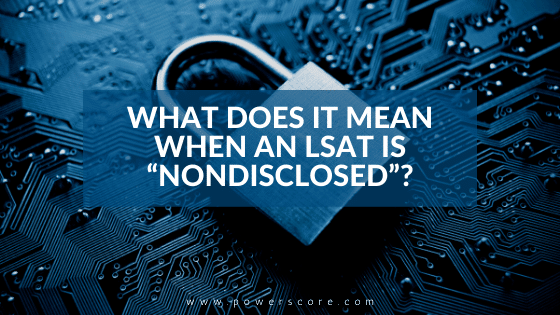If you’ve ever taken an LSAT or looked through the LSAC website, you probably familiar with the notice LSAC places on every LSAT registration page. It’s easy to miss, and it really should be in big, bold red flashing letters–taking a nondisclosed LSAT is actually a pretty big deal. But why?
What is a Disclosed Test?
Let’s first start by explaining to what the terms disclosed and nondisclosed apply. They don’t actually apply to the specific topics of the questions on the test, or to what you need to do for the test. They apply to what happens after the test; specifically, to what you get from the test.
When you take a disclosed LSAT, you get the following information along with your score, percentile, and score band:
- A copy of the scored sections that contributed to your score (available online for six months following the test date).
- A copy of your answer sheet.
- A copy of the correct answers.
- The score conversion table for the test.
What is a Nondisclosed Test?
When you take a nondisclosed LSAT, you get the following information along with your LSAT score, score band, and percentile:
- Nothing.
That’s right, nothing. You don’t get a copy of the questions, your answer sheet, the correct answers, or the score conversion sheet. All you get is your score and percentile.
In addition to fully nondisclosed LSAT administrations where nobody receives the additional information about the test, certain test-takers won’t have this information released to them even after a publicly disclosed test. These test-takers include:
- Test takers who take a makeup LSAT after the main test administration.
- Sabbath observers who request an alternative test date.
- Any repeating test takers who received the primary test form in a previous test administration. (These test takers would receive a different test form in the current test administration.)
(Note that this policy applies equally to accommodated and nonaccommodated test takers.)
So what? you might ask. That’s not that big a deal. The thing I care about the most is my score, anyway, so if I don’t get a copy of the questions or answers, it doesn’t really matter.
And you’d be right, it doesn’t matter–if you score exactly where you want on that examination. If you don’t score exactly where you wanted, then it starts to matter a great deal. How will you learn from and improve on the test you just took if you…
- …have no idea how you performed on each section.
- …have no idea what kinds of questions you struggled with.
- …can’t study off the test.
- …can’t work through and figure out why you got certain questions wrong.
This is why, in my mind, it makes a lot more sense to take a disclosed test, if you have the opportunity.
Which LSATs are Which?
The list of disclosed and nondisclosed administrations changes each year. In non-pandemic times, there are normally three disclosed administrations:
- A late spring exam (usually June in past years).
- An early fall administration (such as August or September).
- A late fall administration (typically November these days).
Nondisclosed administrations include the following:
- Any administration aside from the above.
- All international administrations.
- Every accommodated LSAT administered.
- Any makeup LSAT.
Information about disclosed and nondisclosed tests can be found on the LSAC website here. For a full list of upcoming LSAT Dates, Deadlines, and Details we update this post regularly with information including whether or not they are disclosing tests.


Leave a Reply